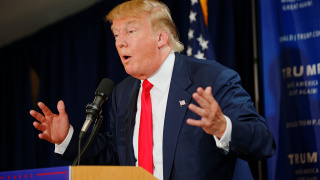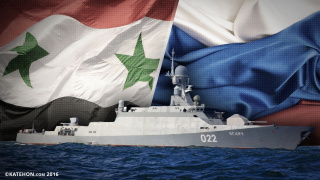Istanbul united Putin, Erdogan, Macron and Merkel
The meeting on Syria was to be held in early September, but was postponed due to the threat of the start of the military operation of Bashar al-Assad in the last bastion of the Syrian opposition - Idlib. This could lead to a humanitarian catastrophe and the flight of thousands of people from the province of 3 million to Turkey, and then to Europe. After September 17, when Vladimir Putin and Recep Tayyip Erdogan in Sochi agreed to create a demilitarized zone (DZ) in Idlib, the Europeans agreed to come to Istanbul.
Truce in Idlib
According to the Putin-Erdogan agreement, by October 10, all heavy weapons had to be removed from the demilitarized zone 15–20 km wide, and by October 15, the militants and members of terrorist organizations. Expectations were too optimistic. Three days after the deadline, Putin noted at the Valdai Forum that the Turks had not yet succeeded in removing all the militants, but “they are working” on this. On October 24, Turkish Defense Minister Hulusi Acar confirmed the withdrawal of the bulk of weapons from the DMZ. On the eve of the summit, Erdogan said that the agreements on Idlib are fulfilled "without problems."
Although the deadlines are stretched, and individual groups - Hayat Tahrir ash-Sham and Huras ad-Din - are trying to thwart the Russian-Turkish agreement, Turkey’s efforts to withdraw the militants and terrorists turned out to be enough to convince French President Emmanuel Macron and German Chancellor Angela Merkel to fly to Istanbul. Last week, the Macron administration threatened to boycott the meeting if the Assad forces launched an attack on Idlib.
Positions of France, Germany, Russia and Turkey: Similarities and Differences
At the meeting in Istanbul, Europeans will focus on two issues: the truce in Idlib and the political process in Syria. The cease-fire is needed to deliver humanitarian supplies from the EU to the province and to reduce Europeans' fears of possible migration of people and militants from the north of Syria to the Old World. Macron and Merkel expect that the process of creating a constitutional commission and the beginning of political transformation, involving the transfer by Asad of some of the powers of the opposition, will accelerate.
Turkey also puts political, non-military aspects of the Syrian settlement.
The location of the summit was not chosen by chance. Turkey is in its views between the EU and Russia. Erdogan with Merkel and Macron will speak with one voice for the extension of the truce in Idlib, the constitutional commission and the political transition. Three politicians do not recognize the legitimacy of Assad. On the other hand, Erdogan, along with Putin, is responsible for the dynamic defense in Idlib, the execution of which is guaranteed by the Turkish and Russian military police. The Russian and Turkish presidents will also try to persuade the EU countries to take part in the reconstruction of destroyed Syria, but Merkel and Macron so far refuse to finance the regions under the authority of the Assad they do not recognize. And Merkel openly spoke about this to Putin during his August visit to Berlin.
Turkey and Russia are also united by their common approaches to the region across the Euphrates River, where, with US patronage, the Kurdish PYD party and its armed wing of the YPG are gradually creating a new state - Syrian Kurdistan. If this topic was raised mostly by the Turks earlier on an everyday basis, then in October, the Russian Foreign Ministry regularly talks about US attempts to ward off eastern Syria. In the Kurdish issue, Merkel and Macron are on the side of the Americans. The French have a pair of military bases in the PYD and YPG territories. For the two European leaders, judging by the leaks in the media, it is important that the Istanbul summit is not regarded as “anti-American” in Washington.
Expectations
Many experts have certain hopes for this meeting. For the first time, with the exception of the Geneva process, a summit will be held in a similar composition, where there will be representatives from the Astana-Sochi format and the so-called small group. One of the main topics of the upcoming meeting is the situation in and around Idlib, since it is in this province that armed militant camps are still in place that could threaten the civilian population in the region, which risks causing another wave of refugees both to Turkey and to Europe.
On the other hand, both Turkey and the EU, unlike, for example, the United States, Britain and Saudi Arabia, which also belong to a small group on Syria, but do not participate in the meeting, are interested in creating conditions for the return of refugees and developing the peace process
All sides have different points of view on the conflict. The main problem will be how strong the agreement on Syria can be created and enforced at this meeting. We know that the position of Russia is different from the position of Assad in relation to the Syrian opposition. As long as the Assad regime refuses to cede power, release prisoners and recognize the legitimacy of the opposition instead of calling it terrorists, it will be extremely difficult to bring the peace process to success. The experience of Iraq once again proved that it is impossible to end the crisis in Syria with a single constitution.
Fundamental differences in the positions of Russia, Turkey, France and Germany will impede the achievement of breakthrough agreements. However, the fact of the meeting in such a format, where the leaders of the anti-Assad camp and Russia will sit at the negotiating table for the first time, can give a start to a serious political process. “Astana triangle” a couple of years ago also seemed to be a fiction project, but the efforts of Erdogan, Putin and Iranian President Hassan Rouhani became the most effective platform in Syria.








